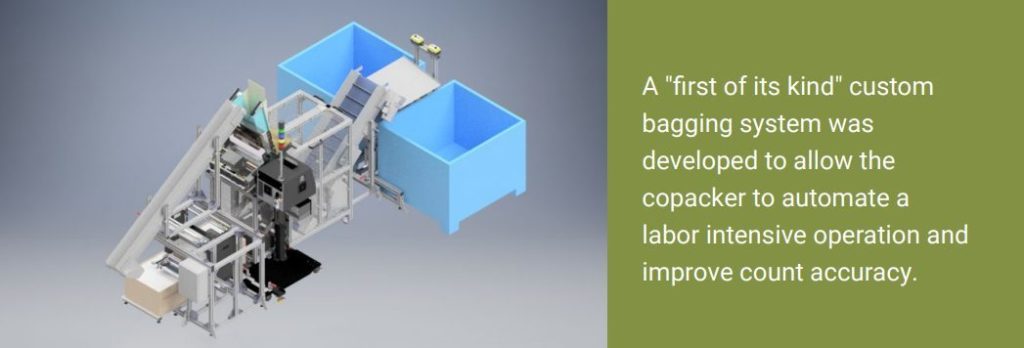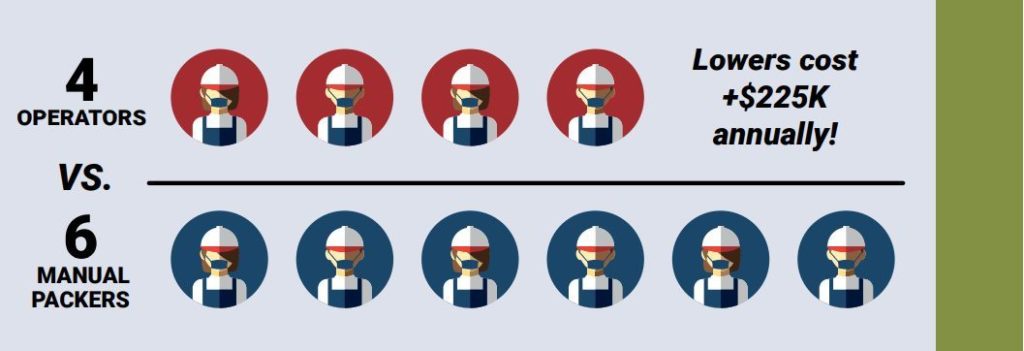CUSTOMER BACKGROUND:
A Midwestern copacker was responsible for taking bagged salad kits and placing 35 to 110 of them into a master bag, depending on the SKU. These small bags contain items such as croutons, dressing, and other salad components that are used to customize menu items. The master packs are sent to multiple foodservice and retail customers who place a kit into a bag or bowl of greens for sale to consumers. The process for bagging the kits was historically extremely labor-intensive. The salad kits were being manually placed in large bags and closed with a twist-tie. As a result, the count accuracy was frequently off resulting in negative customer experience and impact on the business. When the master bag was short of the specified contents, it resulted in customer complaints. If the bag was overfilled profits were being negatively impacted.
The master bag material was made from inexpensive resin, increasing the chances of linear tears and product contamination. Additionally, the copacker had to manually label each bag to identify SKUs.
OBJECTIVE:
Shorr Packaging has been a trusted supplier of packaging equipment including shrink wrappers, carton erectors, tapers and consumable supplies to the copacker. As such, the customer engaged Shorr to help automate the manual process. Shorr engineers visited the site and identified an opportunity to dramatically improve the process by implementing an automated bagging solution. Based on a long history of successful installations of the Sharp Packaging Systems by Pregis® bagging line, Shorr recognized that Pregis was the ideal strategic partner to align with on this project to provide a custom solution backed by exceptional technical support and training.
APPROACH:
To address the inefficient, labor-intensive process, the Shorr and Pregis team introduced a bagging solution to demonstrate how the Sharp bagger could reduce the number of packers. Next, the team illustrated how the process could be improved by eliminating the manual label application with the direct print capabilities of the bagger. The Sharp equipment systems can automatically print variable information directly onto each bag.

In order to convince the decision-makers that this is a superior option for a more efficient and accurate packing process, the team had to first overcome the perceived price discrepancy in manual packaging supplies versus the material cost of the high integrity resin blend required for full automation. By leveraging the expertise of the Pregis R&D group, Pregis was able to engineer a poly consumable that would run on automated equipment and meet the customer’s stringent requirements.
This large-scale project (capacity, # of packing lines, etc) presented a new challenge since the Sharp equipment line typically handles up to 10 pound filled bag weights. However, this application required fill weights of up to 35 pounds. This meant collaborating and developing a “first-of-its-kind” custom system allowing the copacker to automate a very labor-intensive and inaccurate operation.
After the initial proposal was presented, the project stalled. Shorr took the opportunity to invite the copacker to a meeting at its facility so that it could provide an in-person demonstration of the Sharp equipment. Because the copacker’s team was able to see the machine in operation and review detailed custom concepts via 3D renderings, they were better able to understand Sharp’s capabilities and ultimately envision the potential benefit to its operation. From that point on the project was a go.
Due to the complexity of the project, a dedicated Sharp engineer was included in each step of the project and joined every meeting with Shorr and the copacker. In addition to the mechanical aspects of this custom machine, there were additional safety requirements that needed to be engineered into the system, as well as programming specifics which would be critical for automation. Also, the installation was fully backed with on-site technical support and training.
OUTCOME:
In addition to custom engineering the bagging equipment, specifying the right bag material was also critical to a successful conversion. Ultimately a custom bag structure was selected for the application. This custom specification offered good impact/puncture resistance, clarity, and heat-seal performance—ideal attributes to minimize the chance of bag tear, facilitate sealing and protect contents. Further, Pregis’ vertical film integration (extruding, preprinting and converting) capabilities at the Sussex, Wisconsin facility further assures quality objectives.

RESULT: $100K BENEFIT PER YEAR PER MACHINE WITH CONSISTENT RESULTS!
After the unit was installed and the final adjustments were made in-plant, the copacker was pleased with the results and the process improvements. Although bag material costs increased by $100K per year, automating the operation reduced the labor count from six people to four, lowering labor costs by more than $225K annually. The net benefit to the copacker was more than $100K per year per machine. Based on the return on investment the copacker is planning on adding additional machines to its operation. Additionally, the copacker further increased its profits because it was no longer giving away product, and improved its customer relationships by delivering accurate counts.
